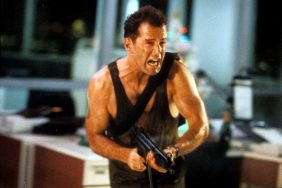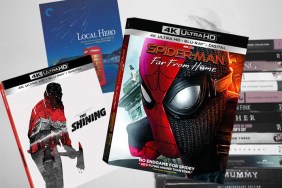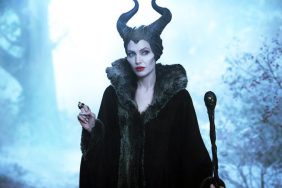On May 30, 2014, audiences around the world will get to see Maleficent, or perhaps simply be dragged to it by Hot Topic enthusiasts and their young nieces or daughters. It is perhaps time to take stock of this fact, consider where this movie came from, and what it potentially means. Because it could mean everything or absolutely nothing. Probably the latter.
Reimaginings of classic fairy tales are nothing new. James Thurber wrote the ultimate modern update of Little Red Riding Hood in 1931’s The Thurber Carnival, in which the classic tale ended with the title character shooting her would-be attacker with an automatic because, quote, “even in a nightcap a wolf does not look any more like your grandmother than the Metro-Goldwyn lion looks like Calvin Coolidge.” The revision had less to do with the violent act itself than it did with providing a well-known tale with an unexpected punchline, and the overall point had far less to do with Red Riding Hood actively dispatching her aggressor and more to do with the story’s stated moral, that “it is not so easy to fool little girls these days as it used to be.” But we keep attempting to fool young audiences into seeing the same movie over and over again, and not acknowledging these fairy tale reboots as the disappointingly unimaginative “reimaginings” they are.
Lately these tales have been experiencing something of a resurgence, thanks to largely successful but mostly crappy films like Tim Burton’s Alice in Wonderland and Rupert Wyatt’s Snow White and the Huntsman. What many of these films have in common is that they attempt to transform old-fashioned tales into bastions of contemporary feminism. That they usually fail seems to be forgiven by the public at large, but there are many of us who think putting a sword in Alice’s hands misses the point of Lewis Carroll’s timeless illogic puzzle, and treating Snow White like the laithe of heaven does her few favors either. In both cases – see also Red Riding Hood and others – characters who have been historically portrayed as a victim or a pawn in the dangerous machinations of the powerful take arms against their aggressors and fight them in soulless action sequences that emphasize the capacity of the characters for physical brutality and diminish their intelligence and agency over their own lives in the process.

But Maleficent, a re-telling of Disney’s animated Sleeping Beauty from the perspective of the villain, has the potential – if nothing else – to reverse this trend, or at least prove to be an exception. Maleficent, played in the movie by Angelina Jolie, was an already unusually powerful character in the Disney Animated universe: a strong, principled ruler with distinctive character flaws (she’s nothing if not prone to overreaction), whose scheme to let the dashing young prince save the comatose princess after he’s too decrepit to enjoy their union is deliciously cruel and yet strangely poetic. She does not need her story to be completely retooled in order to make appear strong on multiple levels.
And yet asking oneself just what the hell made her this way sounds like an intriguing artistic exercise, to retrofit well-reasoned motivation onto a character whose actions were fascinating but whose frame of mind was largely unexplained. Her unique appearance and dramatic presence made Maleficent one of the best Disney villains based on superficiality alone, but the opportunity to give this beloved character depth to match her mystique must have been exciting. Hell, it worked for Wicked. What makes her such a stickler for proper party etiquette? Why does she feel so much hatred for her fairy brethren? Does she have any personal experience with “true love” that makes her justifiably cynical about the prince and princess’s prospective union? Or perhaps the whole plot of Sleeping Beauty was just a comical misunderstanding, like the The True Story of the Three Little Pigs by A. Wolf. The possibilities are endless.
What we’re getting, however, is this.
It starts out okay, with a spot-on, gothic retelling of the curse scene from Sleeping Beauty, and a nicely smarmy performance from Angelina Jolie as Maleficent. But watch as it continues, implying that the whole film will be framed as a run-on villain monologue, about why Maleficent – gasp! that poor woman! – doesn’t have wings. Because reasons? Are wings allegorical with… things? It had better not be femininity. That would be just lame.
In any case, we see that she did have wings, she used them for projectile attacks, and that she fought a war against Sleeping Beauty’s father, played by Sharlto Copley. And then the trailer digresses into a near-endless montage of battle sequences between non-descript knights and left over Ents from The Lord of the Rings: The Two Towers.
This could be a marketing ploy, of course, concocted by cynical individuals who believe that the only way to make a fairy tale successful at the box office is to transform a story about allegorical characters into a non-stop assault on the senses; a simple tale of anxious wonder reduced to us-versus-them warfare, illustrated by computer-generated nonsense at the slightest provocation.

Or, this could very well be exactly what Maleficent is about. And that would make me sad. Because if the whole point of this enterprise was to take a potentially complex and intriguing heroine – or at least an anti-heroine – and use it as an excuse to watch yet another series of video game cut scenes, then why bother at all? The multiplexes are in no way lacking in films about war, but they are lacking in films about rich characters, particularly female characters, with thoughtful motivations which drive meaningful stories forward.
If Maleficent proves smarter than its marketing suggests, then bravo. Well done. I’ll be the first to say it is deserving of praise. But if it is but the latest in an increasing line of perverse devolutions of classic tales that strive for feminist credibility but equate “strong women” with “engines of violence” – and if it does well either in spite of or because of that – we’ll have a problem on our hands, won’t we?
Won’t we?
William Bibbiani is the editor of CraveOnline’s Film Channel and the host of The B-Movies Podcast and The Blue Movies Podcast. Follow him on Twitter at @WilliamBibbiani.






